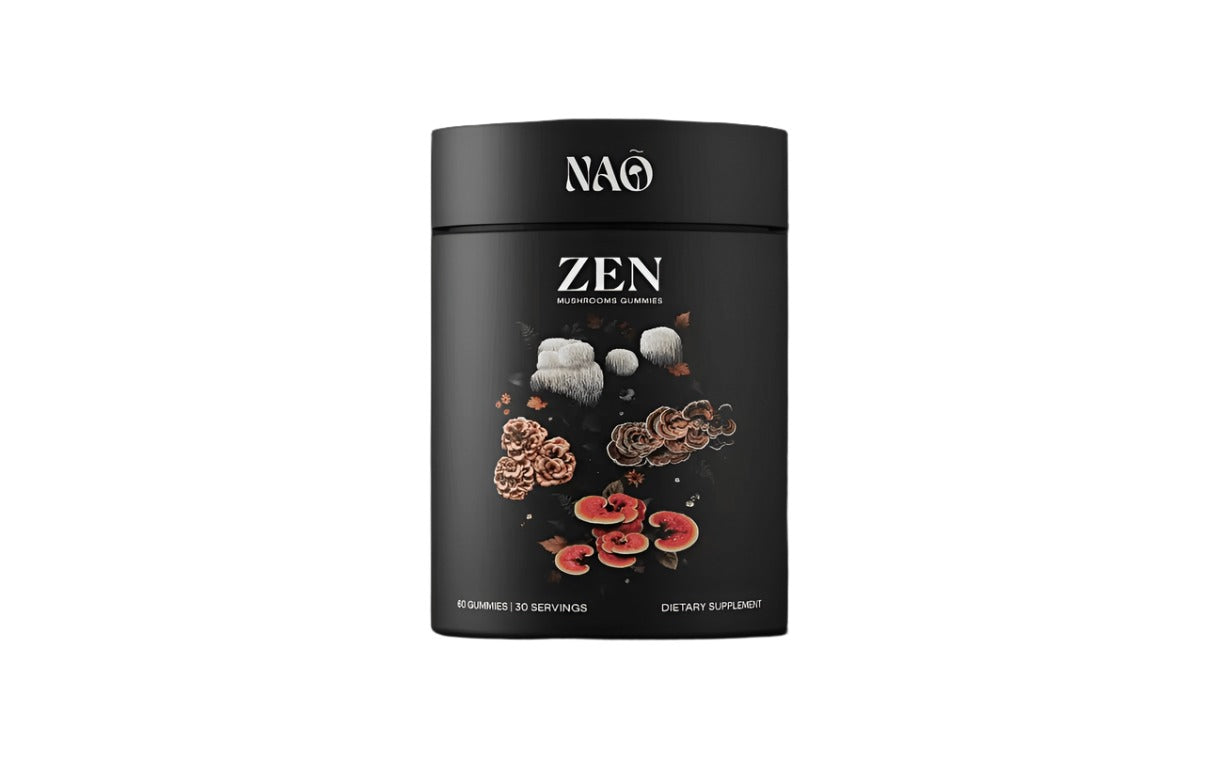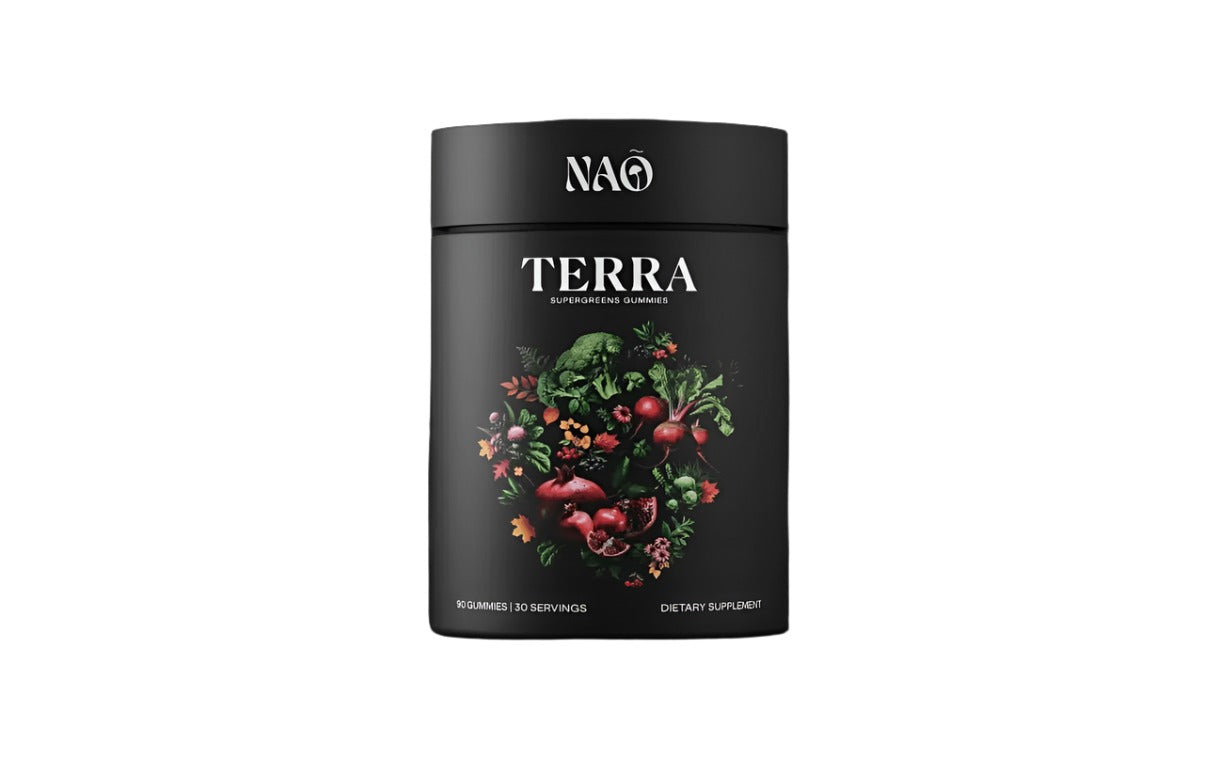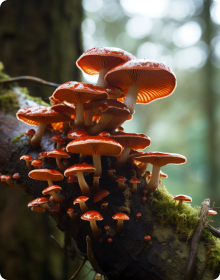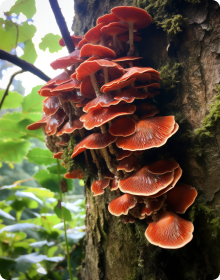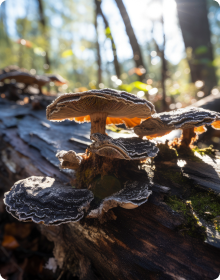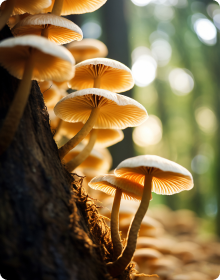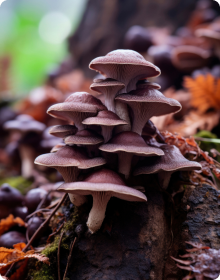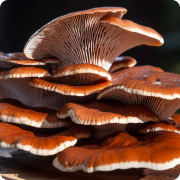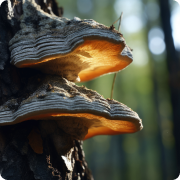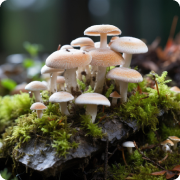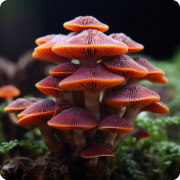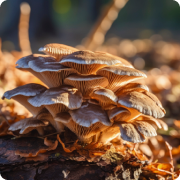In the realm of holistic wellness and traditional medicine, Reishi mushrooms stand out as a revered and ancient remedy, captivating the attention of enthusiasts and health-conscious individuals worldwide. Renowned for their potential health benefits, Reishi mushrooms have a rich history deeply intertwined with traditional medicine practices. This text is dedicated to provide a comprehensive understanding of Reishi mushrooms by exploring them from their geographic location and history to their active components and so on.
What are Reishi Mushrooms: Definition and Brief Overview
Scientifically known as Ganoderma lucidum, Reishi mushrooms are a species of fungi that have been revered for centuries due to their potential medicinal properties. These mushrooms belong to the Polyporaceae family and are characterized by their unique appearance, featuring a glossy, reddish-brown cap with a distinct kidney or fan-like shape.
Reishi mushrooms offer a versatile approach to incorporating their potential benefits into daily life. With a history deeply rooted in traditional medicine, these mushrooms have become a symbol of vitality, longevity, and overall well-being.
Historical Significance and Traditional Use of Reishi
The historical significance of Reishi mushrooms can be traced back to ancient China, where they earned the moniker "lingzhi," signifying the "mushroom of immortality" or the "herb of spiritual potency." In traditional Chinese medicine, Reishi mushrooms were highly esteemed for their believed ability to promote longevity, enhance vitality, and support the body's natural balance. Throughout history, Reishi mushrooms have been associated with royalty and the elite, reserved for use by emperors and nobility due to their perceived health benefits.
Traditional uses of Reishi mushrooms encompass a wide range of health concerns, including immune system support, stress reduction, and overall well-being. The mushrooms were often brewed into teas, incorporated into soups, or consumed in various forms to harness their purported healing properties.
In contemporary times, the interest in Reishi mushrooms has surged, as modern research continues to explore and validate their potential health benefits. As we delve into the intricate tapestry of Reishi mushroom knowledge, it becomes clear that these fungi encapsulate not only a historical legacy but also a promising future in the realms of health and wellness.
Understanding Reishi Mushrooms
Reishi mushrooms possess distinct characteristics that aid in their identification. The cap of the mushroom is typically kidney-shaped or fan-like, with a glossy and varnished appearance. The color of the cap varies, ranging from a deep reddish-brown to a dark, lacquered black. The underside of the cap usually has small pores through which spores are released. The stem of the Reishi mushroom is woody and tough, and the overall texture can be described as lacquered and shiny. However, it is important to note that there are different varieties of Reishi mushrooms, each with its own subtle variations in appearance.
Reishi mushrooms are naturally found in various parts of the world, including Asia, North America, and Europe. They are often associated with hardwood trees, particularly those belonging to the genus Fagus, although they can also be found on other hardwoods. In their natural habitat, Reishi mushrooms play a crucial ecological role by decomposing wood, recycling nutrients, and contributing to the health of forest ecosystems.
Cultivation of Reishi mushrooms has become increasingly popular due to their medicinal and nutritional value. They can be grown on a variety of substrates, including logs, wood chips, and grain-based media. Controlled environments, such as indoor farms, allow for precise conditions to optimize the growth of Reishi mushrooms. Cultivated Reishi mushrooms may exhibit variations in appearance compared to their wild counterparts, but their medicinal properties are still highly valued.
While Reishi mushrooms are not primarily consumed for their nutritional content, they do contain a range of bioactive compounds that contribute to their health benefits. The nutritional composition of Reishi mushrooms includes polysaccharides, triterpenes, proteins, amino acids, vitamins, and minerals.
Reishi mushrooms are typically consumed in supplement form or as extracts, as the tough and woody texture makes them challenging to incorporate into culinary dishes. As such, the focus on Reishi mushrooms is often on harnessing their bioactive compounds rather than their macronutrient content. The synergy of these compounds is thought to contribute to the adaptogenic and health-promoting effects.
Health Benefits of Reishi Mushroom
Reishi mushrooms are famous for these health effects:
- They are renowned for their immune-modulating properties. Compounds like beta-glucans found in these mushrooms have been studied for their ability to enhance the activity of immune cells, promoting a more robust immune response. By supporting the immune system, Reishi mushrooms may help the body defend against infections and diseases.
- They are classified as adaptogens, a group of substances that may help the body adapt to stress and maintain balance. The adaptogenic properties of Reishi mushrooms are believed to help regulate the body's response to stressors, both physical and mental. Consuming Reishi supplements or extracts may contribute to stress reduction and improved resilience to the challenges of daily life.
- Traditionally, these mushrooms have been associated with promoting relaxation and improving sleep quality.
- Research suggests that Reishi mushrooms possess anti-inflammatory properties, primarily attributed to their triterpene content. Chronic inflammation is associated with various health issues, including cardiovascular disease and autoimmune conditions. By mitigating inflammation, Reishi mushrooms may contribute to overall well-being and potentially assist in managing inflammatory conditions.
- Compounds like triterpenes and antioxidants may play a role in reducing blood pressure, improving cholesterol levels, and supporting overall heart health. These effects, combined with the anti-inflammatory properties of Reishi makes it useful for cardiovascular health.
Before incorporating Reishi supplements into your routine, it's better to consult with a healthcare professional, especially if you have existing health conditions or are taking medications. Additionally, Reishi supplements are not a replacement for a balanced diet and a healthy lifestyle but can complement overall well-being when used appropriately.
Active Compounds in Reishi Mushrooms
There are several active compounds that make these mushrooms perspective from the therapeutical point of view:
- Beta-glucans are a type of polysaccharide found in the cell walls of Reishi mushrooms. These compounds are known for their immunomodulatory effects, meaning they can help regulate the immune system. Beta-glucans stimulate various immune cells, such as macrophages and natural killer cells, enhancing the body's ability to defend against infections and diseases. They play a crucial role in supporting overall immune function.
- Triterpenoids, or triterpenes, are a class of organic compounds found in Reishi mushrooms that contribute to their therapeutic properties. These compounds are known for their anti-inflammatory, antioxidant, and potential anti-tumor effects. Triterpenoids are suggested to play a role in supporting cardiovascular health, reducing inflammation, and promoting overall well-being. The specific triterpenoid composition can vary among Reishi mushroom species.
- Ganoderic acid is a specific type of triterpenoid found in Reishi mushrooms. Ganoderic acids may have various health benefits, including anti-inflammatory, antioxidant, and anti-allergic properties. Some studies have also explored their potential anticancer effects. Ganoderic acid is considered one of the bioactive compounds that contribute to the adaptogenic and therapeutic properties of Reishi mushrooms.
- Polysaccharides are complex carbohydrates composed of sugar molecules, and Reishi mushrooms are rich in various polysaccharides. These compounds, particularly beta-glucans and heteropolysaccharides, contribute to the immune-boosting effects of Reishi. Polysaccharides also play a role in the adaptogenic properties, helping the body adapt to stress and maintain balance. Additionally, polysaccharides are associated with the antioxidant activity of Reishi mushrooms, helping to neutralize free radicals in the body.
The combination of these active compounds in Reishi mushrooms contributes to their multifaceted health benefits. Research on these compounds is ongoing, and scientists continue to explore their potential therapeutic applications.
Methods of Consumption and Usage of Reishi Mushrooms
Reishi mushrooms offer a wide range of different forms of consumption:
Teas and Infusions
One of the traditional methods of consuming Reishi mushrooms is by brewing them into teas or infusions. Dried Reishi slices or powdered Reishi extract can be steeped in hot water to create a flavorful and therapeutic beverage. This method is convenient and allows for easy integration into daily routines.
Supplements and Extracts
Reishi mushroom supplements, available in various forms such as capsules, tablets, or liquid extracts, offer a concentrated and standardized dose of the mushroom's active compounds. Supplements are a popular choice for those seeking a convenient and consistent way to incorporate Reishi into their health regimen.
Tinctures
Reishi tinctures involve extracting the bioactive compounds of the mushroom using alcohol or another solvent. Tinctures are highly concentrated and are typically taken in drop form. They offer a potent and easily absorbed way to consume Reishi, allowing for flexibility in dosage.
Powders
Reishi mushroom powder, obtained by grinding dried Reishi mushrooms, can be added to various foods and beverages. This includes smoothies, soups, stews, or even sprinkled on top of dishes. Incorporating Reishi powder into recipes provides a versatile and culinary-friendly way to enjoy its potential health benefits.
Capsules and Tablets
Reishi capsules or tablets offer a convenient option for those who prefer a straightforward method of supplementation. These are particularly suitable for individuals who may not enjoy the taste of Reishi or find it challenging to incorporate into their diet in other forms.
Culinary Usage
While the tough and woody texture of Reishi mushrooms makes them less palatable in their raw form, some culinary enthusiasts experiment with incorporating them into broths, soups, or slow-cooked dishes. In this way, the beneficial compounds can be extracted during the cooking process.
Combination Formulas
Reishi mushrooms are often included in combination formulas with other adaptogenic herbs or functional mushrooms to enhance their overall health benefits.
Topical Applications
Some skincare products and topical creams include Reishi extracts for their potential benefits on skin health. These products may be designed to support skin rejuvenation, reduce inflammation, or address specific dermatological concerns.
When incorporating Reishi mushrooms into your routine, it's essential to consider individual preferences, health goals, and any potential contraindications.
Overview of Recent Scientific Findings
Reishi mushrooms (Ganoderma lucidum) have been the subject of numerous scientific studies in recent years, exploring their potential health benefits and therapeutic properties. While research on Reishi mushrooms is ongoing, several findings highlight their diverse effects on the body.
Immunomodulatory Properties
Recent studies have continued to investigate the immunomodulatory effects of Reishi mushrooms. The beta-glucans and polysaccharides present in Reishi have been shown to stimulate the activity of immune cells, enhancing the body's defense mechanisms. This research supports the traditional use of Reishi mushrooms for immune system support.
Anti-Inflammatory Effects
Scientific investigations have explored the anti-inflammatory properties of Reishi mushrooms, particularly attributed to triterpenoids like ganoderic acid. Chronic inflammation is associated with various health conditions, and Reishi's potential to modulate inflammatory pathways is of interest for its broader implications in health and wellness.
Adaptogenic and Antioxidant Effects
The adaptogenic properties of Reishi mushrooms, aiding the body in adapting to stress, have been a focus of research. Additionally, the antioxidant effects of Reishi, attributed to its triterpenes and polysaccharides, may contribute to cellular protection against oxidative stress.
Clinical Trials and Their Implications for Immune Support and Sleep
Clinical trials examining the immune-supporting properties of Reishi mushrooms have shown promising results. For example, a trial published in the International Journal of Medicinal Mushrooms (2014) shown that Reishi supplementation increased various immune parameters, including the activation of natural killer cells. These findings suggest the potential of Reishi mushrooms to modulate immune function.
While research on Reishi and sleep is limited compared to its immune-related studies, some investigations suggest a potential role in sleep enhancement. A study published in the journal Pharmacology, Biochemistry, and Behavior (2012) reported that Reishi spore oil exerted a sleep-promoting effect in rats. Although more human studies are needed, these preliminary findings hint at Reishi's potential involvement in promoting relaxation and improving sleep quality.
Reishi Mushrooms for Sleep
As was said earlier, while research on Reishi mushrooms and sleep is still emerging, the interest in their potential role in promoting better sleep quality and duration is rapidly growing. Some studies have suggested positive effects on sleep patterns, although more research is needed to establish definitive conclusions.
Potential Mechanisms Behind Reishi's Sleep-Enhancing Effects:
- By promoting adaptability to stressors, Reishi mushrooms may indirectly contribute to improved sleep quality.
- Triterpenes, including ganoderic acids, are bioactive compounds found in Reishi mushrooms. These compounds are known for their anti-inflammatory and calming effects. By modulating inflammatory pathways and promoting a relaxed state, triterpenes may contribute to better sleep quality.
- Inflammation has been linked to sleep disorders, and the anti-inflammatory properties of Reishi mushrooms may play a role in improving sleep. By reducing systemic inflammation, Reishi mushrooms could positively impact sleep patterns.
Adaptogenic Properties and Stress Response
Reishi mushrooms are valuable in helping the body adapt to and manage stress because of their adaptogenic essence: Reishi's adaptogenic qualities may positively impact the stress response by promoting resilience and maintaining physiological balance.
The adaptogenic effects of Reishi mushrooms are thought to be mediated through interactions with the hypothalamic-pituitary-adrenal (HPA) axis, which is a crucial system involved in the body's stress response. By modulating the HPA axis, adaptogens like Reishi may help regulate the release of stress hormones, such as cortisol, and prevent the negative effects of chronic stress.
Cortisol is a hormone released by the adrenal glands in response to stress, and chronically elevated cortisol levels can have detrimental effects on health, including disruptions in sleep, immune function, and metabolic balance.
Research suggests that Reishi's bioactive compounds, including triterpenes and polysaccharides, may play a role in regulating cortisol production. By modulating the
HPA axis, Reishi may help prevent excessive cortisol release during stressful situations, promoting a more balanced and adaptive stress response.
Precautions and Potential Side Effects of Reishi Mushrooms
Despite their positive effects, you should also take into account some cautions.
Allergic Reactions
Allergic reactions can manifest as skin rashes, itching, or respiratory symptoms. It's essential to start with a small amount when incorporating Reishi into your routine, especially if you have known allergies to mushrooms.
Interaction with Medications
Reishi mushrooms may also interact with certain medications. If you are taking medications or have pre-existing health conditions, it's crucial to consult with a healthcare professional before using Reishi supplements. Reishi may potentially interact with blood-thinning medications, antihypertensive drugs, or immunosuppressants. It's also advisable to avoid Reishi if you are scheduled for surgery, as it may impact blood clotting.
Gastrointestinal Upset
Some individuals may experience mild gastrointestinal upset, including stomach discomfort or diarrhea, when consuming Reishi mushrooms. Starting with a lower dose and gradually increasing it may help mitigate these effects. If digestive issues persist, it's advisable to discontinue use.
Pregnancy and Breastfeeding
As a precaution, pregnant or breastfeeding woman should consult with a healthcare professional before incorporating Reishi into their routine due to the lack of comprehensive studies on its safety in these populations.
Reishi Mushroom in Autoimmune Conditions
Reishi mushrooms have immune-modulating properties, and individuals with autoimmune conditions should exercise caution when considering Reishi supplements. The potential effects on the immune system could exacerbate or complicate autoimmune conditions.
Safe Dosage Guidelines
Determining a safe and effective dosage of Reishi mushrooms can depend on factors such as the individual's health status, age, and overall sensitivity. It's important to follow recommended dosage guidelines provided by reputable sources or healthcare professionals. Common dosage forms include:
- Powder or Extract: Typically, a daily dosage ranges from 1 to 3 grams of Reishi mushroom powder or extract.
- Capsules or Tablets: Dosages may vary, and it's essential to follow the instructions on the product label. Common doses can range from 1 to 2 capsules per day.
- Tea or Tincture: If using Reishi in tea or tincture form, follow the recommended preparation instructions on the product packaging.
Starting with a lower dose and gradually increasing it allows individuals to assess their tolerance and observe any potential side effects. It's crucial to monitor for any adverse reactions and seek medical advice if concerns arise.
The journey into the world of Reishi mushrooms reveals a rich tapestry of historical significance, adaptogenic prowess, and potential health benefits. While research is ongoing and our understanding continues to evolve, the available evidence suggests that Reishi mushrooms hold promise as a holistic health support.
In the ever-evolving landscape of holistic health, Reishi mushrooms beckon as a natural and ancient remedy with the potential to enhance immunity, alleviate stress, and contribute to restful sleep. Reishi mushrooms allow us to explore the harmonious intersection of nature and well-being, promoting a balanced and vibrant life.
